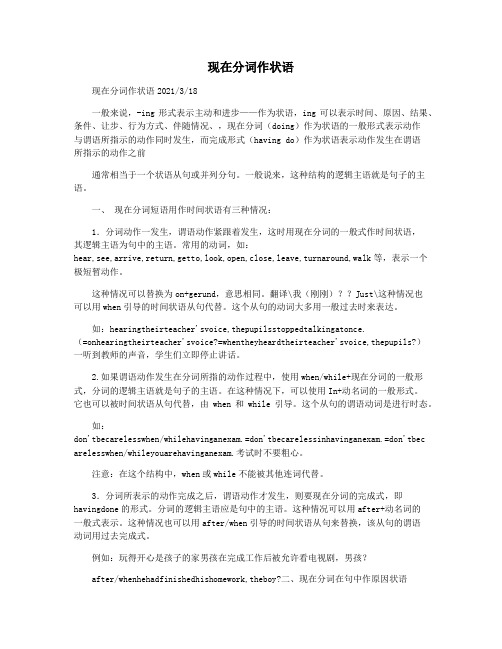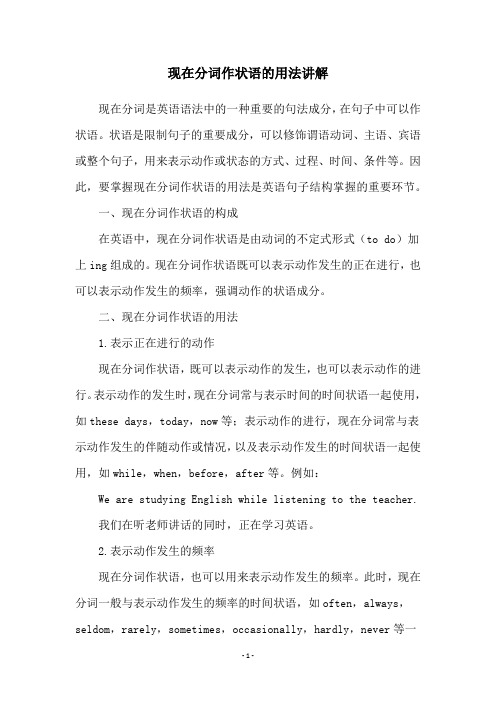现在分词作状语的分类(伴随、让步、条件、时间等等)资料讲解
现在分词作状语有几种形式有用课件

独立式现在分词作状语
总结词
强调动作的独立性和完整性
详细描述
独立式现在分词作状语时,通常强调动作的独立性和完整性。例如,在句子“Sitting at the table, he started to read his book.”中,“Sitting at the table”是独立式现在分词作状语,强调了他坐 在桌子旁开始读书的动作独立于主句,且具有完整性。
动词不定式作状语
总结词
表达目的、原因等意义,增强句子丰富性
详细描述
动词不定式作状语时,通常表示目的、原因等意义,增强了句子的丰富性。例如 ,在句子“To pass the exam, she spent all night studying.”中,“To pass the exam”是动词不定式作状语,表示她花费一整晚学习是为了通过考试。
要点二
结果
使用现在分词作状语可以表达某个事件或动作发生后的结 果。例如,“他讲了一个笑话,大家都笑了起来。”
04
现在分词作状语与其它结 构区别
与独立主格结构区别
独立主格结构
不能单独使用,需要与主句共用一个主语, 常用于描述伴随状况或补充说明。
现在分词作状语
可以单独使用,表达的动作与主句的主语一 致,通常用于描述原因、方式或伴随状况。
03
现在分词作状语的有用性
表达时间关系
时间名词
使用现在分词作状语可以更清晰地表达某个事件或动作发生 的时间点或时间段。例如,“正在跑步的时候,突然下起了 雨。”
描述先后顺序
使用现在分词作状语可以描述两个或多个事件或动作之间的 先后顺序关系。例如,“完成作业后,我开始准备晚餐。”
描述伴随状况
伴随状况
现在分词作状语的分类(伴随、让步、条件、时间等等)

谓语动词:有提示词,句子缺谓语(与主语构成主谓结构)1.1 ______ (tell) by my classmates about that.2. My mother ofte n ________ (stop) me from watch ing TV.时态语态变化,及主谓一致非谓语动词(主动---doi ng, 被动---do ne, 目的/结果/将要to do ,)1. We must also con sider the react ion of the pers on ___ (receive) the gift.2. My pupils, Tom ________ (in clude), liked her.1. He en tered, _____ (hold) a book in his hand.2. He en tered the room and ____ (hold) a book in his hand.3. I politely refused her in vitatio n and (walk) away.4. I politely refused her in vitatio n, (walk) away.两个动词是同时发生的时候主语+谓语1 + and / but + 谓语2主语+谓语,+非谓语1. When he ________ (come) in, I was readi ng a book.2. Uni ess I ______ (in vite), I won 'atte nd he party.3. When _____ (hear) the n ews, I was excited.4. Uni ess __ (in vite), I won 'atte nd he party.---When/ if / unless / /After/Before 等连词后没有主语 + 非谓语(---ing /---ed ), 主句---Whe n / if / un less / /After /Before 等连词 + 主语 + 谓语,主句1. A boy _______ ( call ) Jack came here today2. A boy who ________ ( call ) Jack came here today3. We enjoy the movie ________ (direct) by a world famous artist.4. We enjoy the movie which ________ (direct) by the world famous artist.名词后没关系词时+非谓语,非谓语动词修饰前面的名词做定语名词后有关系词时+谓语,做定语从句中的谓语1. You can 'catch me! ” Janet shouted, _______ (run) away.2. He said tha nks and __ (smile) a row of teeth.3. When first ___________ (in troduce) to the market, these products enjoyed greatsuccess.4. When he _______ ( arrive ) at the corner , he met his friend.5. ________ ( sleep ) late, he turned off the alarm clock.6. Don 'tuse words, expressi ons, or phrases ___ (know) only to people withspecific kno wledge.[例 1] I got on the bus and found a seat near the back, and then I noticed a man18 _ (sit) at the fro nt. ( 2011 广东卷)[例 2] He spit it out, __37 (say) it was awful. ( 2010 广东卷)[例 3]The fact that so many people still smoke in public places ____________ t hat we mayn eed a n ati on wide campaig n to raise aware ness of the risks of smok ing.A. suggestB. suggestsC. suggestedD.suggest ingturn1. If you ___ to the left, you'll find the post office.2. ____ to the left, and you'll find the post office.3. to the left , you'll find the post office .[例 4] She wished that he wasas easy 32 _____ (please)as her mother ,who was alwaysdelighted with perfume . (2009 广东卷)see(1)_______ from the top of the hill, our house looks like a car.(2)_______ the dog come over, our friend ran away.(3) _______ from the top of a hill, and you ' II find the city more beautiful.(4) _______ more clearly, they came up and got close to it.1. When _____________ different cultures, we often pay attention only to the differences without noticing the similarities.2. _________ with other top stude nts, you are better.discuss(1) ___________________________ The question now at the meeting is very important.(2) ___________________ The question at the meeting last week is very important.(3) _____________________________ The questi on at the meeti ng n ext week is very importa nt.1. ____ many times, but he still could n't understand it.2. ____ many times, he still could n't un dersta nd it.A. Havi ng bee n toldB. ToldC. He was toldD. To be told1. He is the best one ____ (do) the job.2. He was con sidered the first man ______________ (invent) the teleph one.动词不定式的动作先于谓语动词的动作而发生用to have done1. ___ in thought, he almost ran into the car in front of him. (lose)2. ___ of_play ing football, he went back to the classroom. (tire)3. ___ with_difficulty, he rushed forward bravely. (face)有些过去分词源于系表结果,分词已经形容词化,相当于形容词be lost in; be interested in; be tired of; be satisfied with ; be excited about;be faced with; be dressed in ; be seated1. He hurried to the booking office , only ______________ (tell) that all the ticketshad bee n sold out.to do表示结果一表示出人预料的情况或结果,常用only强调。
分词短语作状语讲解

分词短语作状语
【知识点解析】
四、用作让步状语 [典型例句] Living miles away, he attended the course. 虽然住在几英里以外,他仍去上课。 Defeated, he remained a popular boxer. 虽然被击败了,他仍是一个受欢迎的拳击手。 [理解技巧]分词(短语)用作让步状语通常可转换成由从属连 词though, although, no matter…等引导的让步状语从句,如: Although he lived miles away, he attended the course. Thought he was defeated, he remained a popular boxer.
_____ a record US$ 57.65 a barrel on April 4. (2005山东卷)
A. have reached B. reaching
C. to reach
D. to be reaching
【答案】B 【解析】此句也可换成:Oil prices have risen by 32 percent since the start of the year and reache【知识点解析】
[高考实例] (1) ______ with so much trouble, we failed to complete the task on time. (2006四川卷) A. Faced B. Face C. Facing D. To face
【答案】A 【解析】 faced with so much trouble可转换成原因状语从句because we were faced with so much trouble.
现在分词作状语

现在分词作状语现在分词作状语2021/3/18一般来说,-ing形式表示主动和进步——作为状语,ing可以表示时间、原因、结果、条件、让步、行为方式、伴随情况、,现在分词(doing)作为状语的一般形式表示动作与谓语所指示的动作同时发生,而完成形式(having do)作为状语表示动作发生在谓语所指示的动作之前通常相当于一个状语从句或并列分句。
一般说来,这种结构的逻辑主语就是句子的主语。
一、现在分词短语用作时间状语有三种情况:1.分词动作一发生,谓语动作紧跟着发生,这时用现在分词的一般式作时间状语,其逻辑主语为句中的主语。
常用的动词,如:hear,see,arrive,return,getto,look,open,close,leave,turnaround,walk等,表示一个极短暂动作。
这种情况可以替换为on+gerund,意思相同。
翻译\我(刚刚)??Just\这种情况也可以用when引导的时间状语从句代替。
这个从句的动词大多用一般过去时来表达。
如:hearingtheirteacher'svoice,thepupilsstoppedtalkingatonce.(=onhearingtheirteacher'svoice?=whentheyheardtheirteacher'svoice,thepupils?)一听到教师的声音,学生们立即停止讲话。
2.如果谓语动作发生在分词所指的动作过程中,使用when/while+现在分词的一般形式,分词的逻辑主语就是句子的主语。
在这种情况下,可以使用In+动名词的一般形式。
它也可以被时间状语从句代替,由when和while引导。
这个从句的谓语动词是进行时态。
如:don'tbecarelesswhen/whilehavinganexam.=don'tbecarelessinhavinganexam.=don'tbec arelesswhen/whileyouarehavinganexam.考试时不要粗心。
现在分词作状语的用法讲解

现在分词作状语的用法讲解现在分词是英语语法中的一种重要的句法成分,在句子中可以作状语。
状语是限制句子的重要成分,可以修饰谓语动词、主语、宾语或整个句子,用来表示动作或状态的方式、过程、时间、条件等。
因此,要掌握现在分词作状语的用法是英语句子结构掌握的重要环节。
一、现在分词作状语的构成在英语中,现在分词作状语是由动词的不定式形式(to do)加上ing组成的。
现在分词作状语既可以表示动作发生的正在进行,也可以表示动作发生的频率,强调动作的状语成分。
二、现在分词作状语的用法1.表示正在进行的动作现在分词作状语,既可以表示动作的发生,也可以表示动作的进行。
表示动作的发生时,现在分词常与表示时间的时间状语一起使用,如these days,today,now等;表示动作的进行,现在分词常与表示动作发生的伴随动作或情况,以及表示动作发生的时间状语一起使用,如while,when,before,after等。
例如:We are studying English while listening to the teacher.我们在听老师讲话的同时,正在学习英语。
2.表示动作发生的频率现在分词作状语,也可以用来表示动作发生的频率。
此时,现在分词一般与表示动作发生的频率的时间状语,如often,always,seldom,rarely,sometimes,occasionally,hardly,never等一起使用。
例如:He is always playing computer games.他总是玩电脑游戏。
三、现在分词作状语的特殊情况1.在分词作独立主格结构在句子中,现在分词与主语之间也可以组成独立结构,即现在分词作独立主格结构,表示一种客观存在的状态。
此时,现在分词作独立主格结构,可以表示谓语动词所描述的动作发生的情况,也可以表示谓语动词的客观存在的状态。
Seeing is believing.百闻不如一见。
现在分词作状语独立主格结构讲义-高三英语二轮复习

高考英语语法应用讲解一、现在分词作状语在写作中的应用(一)现在分词做时间状语现在分词表示的动作和谓语动作同时发生或紧接着发生,就用一般式:Ving例句1:Hearing the good news, they all jumped with joy.听到这个好消息,他们都高兴得跳起来。
可以用时间状语从句替换:When they heard the good news, they all jumped with joy.例句2:Standing on the stage, a sense of tension welled up in my heart.站在舞台上,紧张感油然而生。
可以用时间状语从句替换:When I stood on the stage, a sense of tension welled up in my heart.仿写练习:看着这些照片,往日记忆涌上心头。
1.用现在分词作时间状语:_______________________________2.可以改为时间状语从句:_______________________________【答案】1.Seeing these photos, memories of those old days flooded into his mind2.When I saw these photos, memories of those old days flooded into his mind.在强调现在分词动作先于谓语动作时,用完成式:having doneeg:Having eaten her lunch, the girl rushed out.那女孩吃完了午饭就跑出去了.(先吃eat 后跑出rush out)Having thought about the present situation for a while, Roy decided to apologize to Jane .思考现状一会儿后,Roy 决定向Jane道歉。
现在分词短语作状语要点总结
现在分词短语作状语要点总结现在分词作状语时,可表示时间、原因、条件、方式、伴随、结果、让步或补充说明等不同含义。
Coming into the room, he found the books. 他一进屋就找到了书。
(时间)Being ill, he didn’t attend the meeting. 因为病了,他没有参加会议。
(原因)Working hard, you will succeed. 如果你努力就会成功。
(条件)The girls went out of the room, laughing and talking, 姑娘们又说又笑地走出房间。
(伴随)He came here running. 他跑着来到这里。
(方式)At he age of three, his mother died, leaving him an orphan. 他三岁时丧母,成了孤儿。
(结果)She went away, walking south. 她离开了,向南方走去。
(补充说明)由以上例句可以看出,分词短语作状语时,若表示时间、条件或原因,通常要放在句首;表示伴随(也可放在句首)、方式、结果或补充说明的分词短语,通常要放在句尾。
现在分词作状语时要注意以下六个要点:1. 现在分词可以与when, while, if ,though等连词一起使用,使状语意义更加明确。
如:Be careful when crossing the street. 过马路要当心。
If falling ill, I’ll stay home taking a good rest. 如果生了病,我要在家好好休息。
Though not understanding French, they had a very good time in Paris this summer. 虽然他们不懂法语,但是,今年夏天他们在巴黎过得很愉快。
2. 现在分词作状语时,其逻辑主语通常应与句子主语保持一致,也就是说句子的主语应是现在分词动作的执行者。
现在分词作状语的分类(伴随、让步、条件、时间等等)
doing sth 作状语的分类☆一般来说,-ing形式表示主动、进行;过去分词表示被动、完成。
☆-ing形式作状语,可以表示时间、原因、结果、条件、让步、行为方式、伴随状况等。
如:▲doing sth.作时间状语:﹡Seeing my parents waving in the crowd,I went running to them.﹡Crossing the road, the old man was knocked over by a car.=When he was crossing the road, the old man was knocked over by a car.﹡(When) Hearing the news, he got frightened.= When he heard the news, he got frightened.﹡Having eaten his dinner, the boy rushed out.﹡Hearing their teacher's voice, the pupils stopped talking at once.﹡Having received his letter, I decided to write back.▲doing sth.作原因状语:Being a teacher,you should help your students in every way.Being poor, he couldn’t afford a TV set.Not knowing her address, I can't write to her.Having lived with the girl for 5 years, we all know her very well.Having eaten too much, he couldn’t go to sleep.▲doing sth.作结果状语:﹡There is mud and water everywhere, making it difficult to travel from place to place.making it difficult to travel from place to place 是结果状语。
高中英语知识点归纳分词作状语的常见形式
高中英语知识点归纳分词作状语的常见形式分词作状语指的是分词在句子中修饰主句动词,起到状语的作用。
在高中英语中,学习分词作状语是一个重要的语法知识点。
下面将介绍分词作状语的常见形式。
一、现在分词作状语现在分词作状语表示的动作与主句动作同时进行。
1. 表示伴随状况例如:- She entered the room, smiling.她一边走进房间,一边微笑着。
- The girl sat on the bench, reading a book.那个女孩坐在长凳上,一边读书。
2. 表示原因状况例如:- Being tired, he went to bed early.因为疲倦,他早早上床睡觉了。
- The weather being bad, they stayed at home.由于天气不好,他们呆在家里。
3. 表示条件状况例如:- I will go to the park, weather permitting.天气允许的话,我会去公园。
- We went out, the rain having stopped.雨停了,我们出去了。
4. 表示方式、手段状况例如:- He ran to the bus stop, hoping to catch the bus.他跑到公交车站,希望能赶上公交车。
- The boy solved the math problem, using the formula he had learned.这个男孩用他学过的公式解了这个数学问题。
二、过去分词作状语过去分词作状语表示的动作发生在主句动作之前。
1. 表示时间状况例如:- Having finished his homework, he went out to play.他完成了作业后,出去玩了。
- We arrived at the airport, having missed the flight.我们到达机场时,航班已经错过了。
分词作状语用法知识点详解和辨析
分词作状语用法知识点详解和辨析分词做状语,在我们的英语表达里有何用法与见解呢?以下是给大家带来分词作状语用法,以供参阅。
英语分词的形式非谓语动词主动形式被动形式意义现在分词一般式doing being done与句中谓语动作几乎同时发生完成式having donehaving been done先于句中谓语动作发生,强调时间先后过去分词done-----------------与句中主语为逻辑上的被动,表完成英语分词的意义在英语中,分词包括现在分词与过去分词两种形式,即“-ing”与“-ed”。
一般情况下,从时态和语态两种角度来讲,现在分词表示主动、进行;而过去分词表示被动与完成。
对于分词的含义,我们从以下两组词语为例进行分析:1)the sinking ship 正在下沉的船& falling leaves 正在飘落的树叶2)the sunken ship 已经沉底的船& fallen leaves 落在地上的树叶\ the boiled water 凉白开水1)从语态角度来看,现在分词表示主动含义,它与所修饰的名词构成主谓关系。
the sinking ship 可以改写为the ship that is\ wassinking, 这里的ship相当于sink的逻辑主语。
其次,从时态角度看,现在分词一般表示进行的动作,相当于一个进行时态;此外,它还可以表示一般的动作,相当于一个一般的时态。
综上,现在分词的意义有两种:主动进行的动作和主动一般的动作。
2)从语态角度来看,过去分词可以表示被动含义也可以表示主动含义,即动词不同则含义不同。
及物动词的过去分词只有被动含义,如the boiled water=the water that was boiled \ the water that has been boiled. 而不及物动词没有被动只有主动,如the sunken ship= the ship that has sunken.但是不及物动词的过去分词出现频率较低,常见的过去分词多为及物动词的过去分词,表达被动含义。
- 1、下载文档前请自行甄别文档内容的完整性,平台不提供额外的编辑、内容补充、找答案等附加服务。
- 2、"仅部分预览"的文档,不可在线预览部分如存在完整性等问题,可反馈申请退款(可完整预览的文档不适用该条件!)。
- 3、如文档侵犯您的权益,请联系客服反馈,我们会尽快为您处理(人工客服工作时间:9:00-18:30)。
谓语动词: 有提示词, 句子缺谓语(与主语构成主谓结构)I. I _______ (tell) by my classmates about that.2. My mother often __________ (stop) me from watching TV.时态语态变化, 及主谓一致非谓语动词(主动---doing , 被动---done, 目的/结果/将要to do ,)1. We must also consider the reaction of the person __________ (receive) the gift.2. My pupils, Tom__________ (include), liked her.1. He entered, ________ (hold) a book in his hand.2. He entered the room and _______ (hold) a book in his hand.3. I politely refused her invitation and _____ (walk) away.4. I politely refused her invitation, ______ (walk) away.两个动词是同时发生的时候主语+ 谓语1 + and / but + 谓语2主语+ 谓语,+非谓语1. When he _______ (come) in, I was reading a book.2. Unless I ________ (invite), I won’t attend he party.3. When _____ (hear) the news, I was excited.4. Unless ____ (invite), I won’t attend he party.--- When / if / unless / /After/Before 等连词后没有主语+非谓语(--- ing /---ed ) , 主句---When / if / unless / /After /Before等连词+ 主语+ 谓语,主句1. A boy ________( call ) Jack came here today2. A boy who ________( call ) Jack came here today3. We enjoy the movie _________ (direct) by a world famous artist.4. We enjoy the movie which_________ (direct) by the world famous artist.名词后没关系词时+ 非谓语, 非谓语动词修饰前面的名词做定语名词后有关系词时+谓语,做定语从句中的谓语1.“You can’t catch me!” Jan et shouted, _______ (run) away.2.He said thanks and ____ (smile) a row of teeth.3.When first ___________ (introduce) to the market, these products enjoyed great success.4.When he_______( arrive ) at the corner , he met his friend.5.________ ( sleep ) late, he turned off the alarm clock.6.Don’t use words, expressions, or phrases _______(know) only to people with specificknowledge.[例1] I got on the bus and found a seat near the back, and then I noticed a man 18 (sit) at the front. (2011广东卷)[例2] He spit it out, __37___(say) it was awful. (2010广东卷)[例3]The fact that so many people still smoke in public places _______ that we may need a nationwide campaign to raise awareness of the risks of smoking.A. suggestB. suggestsC. suggestedD. suggestingturn1. If you _____to the left, you'll find the post office.2. _____ to the left, and you'll find the post office.3. to the left , you'll find the post office .[例4] She wished that he was as easy 32 (please)as her mother,who was always delighted with perfume.(2009广东卷)see(1)_______ from the top of the hill, our house looks like a car.(2)_______ the dog come over, our friend ran away.(3)_______ from the top of a hill, and you’ ll find the city more beautiful.(4)_______ more clearly, they came up and got close to it.1. When ____________ different cultures, we often pay attention only to the differences without noticing the similarities.2.__________ with other top students, you are better.discuss(1)The question _________________now at the meeting is very important.(2)The question ________ at the meeting last week is very important.(3)The question __________________ at the meeting next week is very important.1._____many times, but he still couldn't understand it.2. _____many times, he still couldn't understand it.A. Having been toldB. ToldC. He was toldD. To be told1.He is the best one ______ (do) the job.2.He was considered the first man _______________ (invent) the telephone.动词不定式的动作先于谓语动词的动作而发生用to have done1. in thought, he almost ran into the car in front of him. (lose)2. of playing football, he went back to the classroom. (tire)3. with difficulty, he rushed forward bravely. (face)有些过去分词源于系表结果,分词已经形容词化,相当于形容词be lost in; be interested in; be tired of; be satisfied with ; be excited about; be faced with; be dressed in;be seated1.He hurried to the booking office,only _____________ (tell) that all the tickets had beensold out.to do表示结果—表示出人预料的情况或结果, 常用only强调。
2.European football is played in 80 countries, ____________ (make) it the most popular sportin the world.分词表示结果包含着一种必然发生的结果。
His father died last year, (leave) him a large fortune.1. The flowers sweet in the garden attract the visitors to the beauty of nature.A. to smellB. smellingC. smeltD. to be smelt“闻起来很香”用来作定语修饰主语flowers。
感官动词没有被动。
v-ing作状语的分类☆一般来说,v-ing形式表示主动、进行;过去分词表示被动、完成。
☆-ing形式作状语,可以表示时间、原因、结果、条件、让步、行为方式、伴随状况等。
▲doing sth.作时间状语:﹡(see) my parents waving in the crowd,I went running to them.﹡(cross) the road, the old man was knocked over by a car.=When he (cross) the road, the old man was knocked over by a car.﹡When (hear) the news, he got frightened.= When he (hear) the news, he got frightened.﹡Having eaten his dinner, the boy (rush) out.﹡(hear) their teacher's voice, the pupils stopped talking at once.﹡(not receive) his letter, I decided to write another letter.▲doing sth.作原因状语:(be) a teacher,you should help your students in every way.(be) poor, he couldn’t afford a TV set.(not know) her address, I can't write to her.(live) with the girl for 5 years, we all know her very well.(eat) too much, he couldn’t go to sleep.▲doing sth.作结果状语:﹡There is mud and water everywhere, (make) it difficult to travel from place to place. 现在分词作结果状语表示一种必然性(自然结果)。
